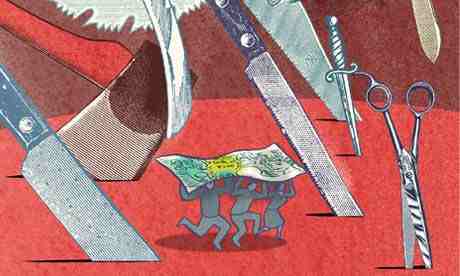
While Tory and Lib Dem MPs were contemptuously rejecting all seven Lords amendments to the welfare reform bill on Wednesday, I was at a credit union in London’s East End, listening to low earners and unemployed people struggling to save small sums to avoid loan sharks. Admirable, but little protection from a tidal wave of cuts heading their way. For people like them, this year’s rolling housing benefit cuts will take £17 a week.
That same morning the Institute for Fiscal Studies delivered its verdict: double-dip recession and a miserable 0.3% growth rate. Worry about shut libraries? Then this should make your hair stand on end: only 6% of public service cuts have happened yet. Another 94% are still to come, with cascades more public servants sacked. In benefits, 88% of cuts are still to come. But Tory and Lib Dem MPs voted through an £18bn benefit cut for the “squeezed” bottom half with few qualms, taking £1,400 from disabled children and £94 a week from the sick who don’t die or recover within a year.
The IFS says these cuts are “almost without historical or international precedent”. “How deliverable these will prove remains to be seen,” it adds. The answer is blindingly obvious. Cuts of these dimensions are impossible. Austerity will not be politically tolerable in a rich country in peacetime where boardrooms pay themselves 49% rises. The Attlee government was toppled by peacetime austerity that voters no longer trusted. The government reassures itself that the country is muddling along, coping with cuts, getting by. But the frightening truth is that it’s hardly begun.
The IFS chart showing the sunny uplands of 2016-17, with a 0.4% current spending surplus, is hard to credit. It’s a dereliction for forecasters to ignore the political reality. A miraculous growth spurt might save the day: but how, when George Osborne’s hyper-austerity smothers all oxygen in the economy? What of a 2015 election, plumb in the middle of this seven-year run of cuts? The irony is that the best hope of hitting that surplus and restoring more growth is that many of these cuts never happen. Cameron will bend or snap or both.
The NHS tops No 10’s risk register, but a close second should be the benefit cuts now being railroaded through by claiming “financial privilege” to avoid another bruising Lords encounter with angry bishops and former Tory cabinet ministers. Cameron’s government by opinion poll tells him he’s on terra firma: the public thinks £26,000 is more than enough benefits for any family. But the public is fickle: starting last month, 670,000 households lose an average of £13 on housing benefit occupancy rules. In council tax benefit, because pensioners are exempt, the rest of low earners will pay an extra £330 a year. In April tax credit cuts take £305 from 2 million households, while the bottom half are already £427 a year worse off in spending power, says the Resolution Foundation. With long-term unemployment set to rise even higher than already predicted, this bill touches millions more voters than Cameron expects. It may not touch his leafy heartlands, best protected from council cuts, but elections are won among middling folk: wait for the great cuts tsunami to hit them.
If bad news is good news for Labour, then it’s been a good week. Ed Miliband’s challenge to the Hester bank bonus sprang from his well-prepared critique of irresponsible capitalism. Ed Balls drew support from the IFS, finding that a £10bn growth stimulus might indeed be available, supporting his own remedies – an emergency VAT cut, a cut in employers’ national insurance, and ready-to-go building projects to stir moribund demand. IFS charts obligingly showed what a small fraction of the debt problem was caused by Labour overspending in the good years, the rest caused by the crash. David Miliband’s irritating attack on old Labour, inevitably trumpeted on the Telegraph, looked curiously out of the loop and irrelevant to what’s happening on the frontline. It rallies the rusty muskets of old Blairites and distracts from the firefight with the real enemy – a government barely begun on its path of destruction. If only he would roll up his sleeves and take a frontline shadow cabinet post – any job is open to him – or do something else altogether. His Commission on Youth Unemployment will next week show how well he can take on the government.
The London Community Credit Union has 12,000 Hackney and Tower Hamlets members, low-earning thrifty savers who are about to be hit hard. Among them was Fenella, who paid off huge rent arrears and now saves £5 a week. She was with her aunt, in bad trouble after borrowing £1,000 in an emergency but now owing the Provident £1,700. A man in his 30s joined the credit union just in time, after he saw friends falling into the snakepit of pay-day loan debt. Most members live on the edge. Ed Miliband’s speech on Friday on “one-nation banking” needs to include those shunned by conventional banks: credit unions still cover only 1%.
Staff here dread the welfare reform bill, waiting for debts, arrears, evictions and pitiful hardship to wash up on their doorstep. Yet Lord Freud declared: “The government remains committed to eradicating child poverty.” The effect of £1,400 cuts for disabled children was “negligible”. The aim of cuts is to “incentivise” people out of “dependency”. Presumably the way kicking away crutches incentivises the lame to walk.
Follow Comment is free on Twitter @commentisfree
guardian.co.uk © Guardian News & Media Limited 2010
Published via the Guardian News Feed plugin for WordPress.
